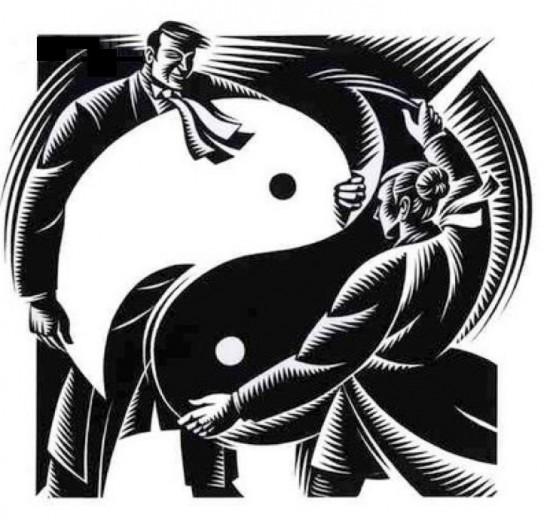
Outgrowing Chess Idiot: The Experience
This is not a how to guide; it’s part of relating a personal chess experience that’s in progress, therefore hard to put into words. Is it relevant to the chess enthusiast? It may be, but more so to the enthusiast part; to put it differently, not one single chess move is mentioned throughout this article – but again, chess moves of other kinds probably do make up its theme.
To give you some general, symbolic idea, think of this experience as the Yin – Yang circle, just darker and less compelling (okay, so my experience is not a ball; it’s not even a circle, for that matter, but in terms of the positive and negative traits,it’s definitely similar to a twisted Yin-Yang thing: it’s got curves, it’s bipolar, it may seem oddly familiar but it’s got a strange, exotic, almost supernatural feeling to it; I’m not talking magic here, but then again, I might be; it depends on how you think of it.) There's a picture going with this blog; that's a nice visual representation of what I have in mind.
Cutting to the chase, it’s been two months since I (re)started my interest in chess, and I already feel like I’m in a strange, bizzare part of the intellectual world that’s just extremely different from everything I’ve been familiar with so far (which is mostly literature and psychology; no wonder it’s different, you might say. But still...) For one thing, I’ve finally come upon something that’s at the same time extremely hard to be even remotely good at (not to mention, excel in), yet the mere performance of which still being almost dumbishly easy to learn (imagine being able to punch like Mike Tyson, yet never winning your local box tournament; that would be frustrating, wouldn’t it?); and yet, studying chess turned out to be so challenging (and the successes, the more so rewarding), that it eventually took hold of most of my working, conscious mind.
For one thing, I should make it clear that chess should definitely not be at the top of my priorities list; definitely my diploma paper (which is due in July, but which is not even half complete) should knock it off that first place. But here I am, spending most of my spare time playing or studying chess (not even knowing if I’m properly studying... go figure).
There are many ups and downs to the process that I’m into right now, which is basically just getting past the „total chess idiot” (own label) status; I can’t help thinking, though, that there may be more downs then ups; that’s not so encouraging, is it?
I’m thinking of the total transfiguratory power that chess seems to have over my brain (and I know I’m not all that unique, so ”the” might as well replace ”my”). It would be interesting to look into the different types of cognitive changes that take place once a person voluntarily exposes themselves to bountiful amounts of chess; I think one might find that, although definitely most interesting from a psychological point of view, these effects aren’t necessarily for the better; and while they might not be for the worse (since who can ever tell what really is bad?) they’re definitely powerful and significant in at least a mysterious, if not obscure way.
When I began writing this article, I thought I would get to at least one tangible issue that I’m having, and which I think is most interesting and illustrative for the purpose of describing the strange effects of prolonged chess playing and studying (and I even had a name for that: it was ”the no-dream situation”); but now, seeing that the few hundred words I’ve written so far make up a stand-alone introduction, I’ll leave it as it is.
The no-dream situation might just be what the next part will be about (that may be a bit of a pretentious ending; after all, nobody may ever read this – if so, why bother writing parts that are never read?).
